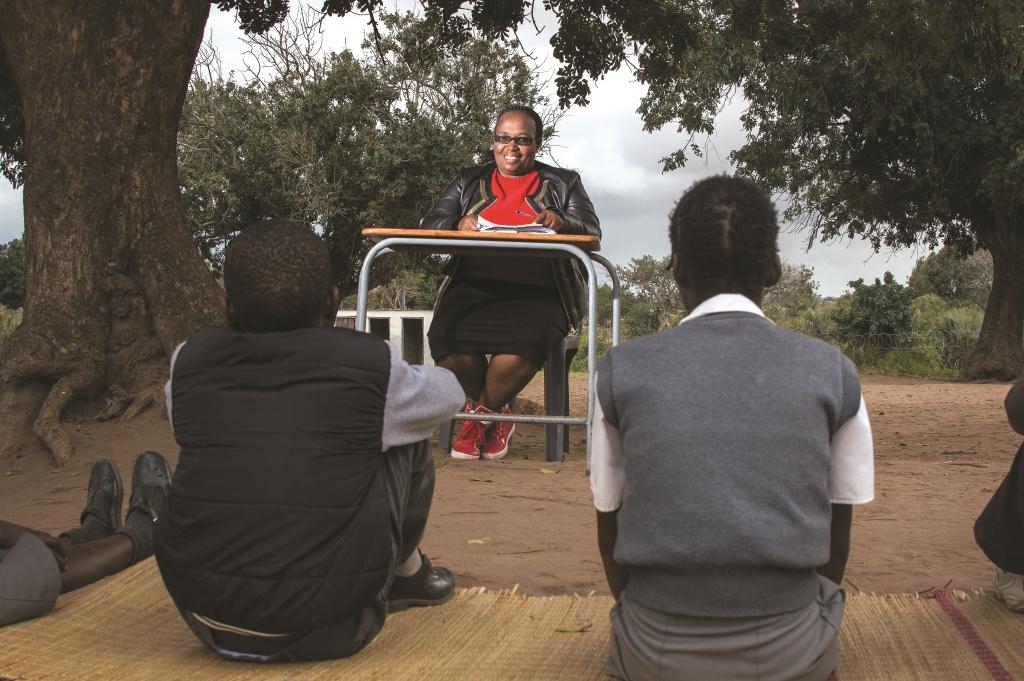It’s a rainy afternoon when we arrive at Nkomo Primary School, in Mnqobokazi, a small village within Hluhluwe town in northern KwaZulu-Natal, a province in South Africa.
The school’s 51-year-old principal, Nomusa Zikhali, approaches us with a smile and a gentle handshake as she welcomes us to her office in a school she first started for a handful of students under four hulking trees.
Zikhali was born and bred in this dry corner of Mnqobokazi. Teaching was always her passion.
“When I was young, I used to play school with my friends and I was always the headmaster. I used to love being a teacher or I’d be a social worker because I loved working with people,” she says.
Zikhali had it tough growing up. She ran away from home, as her father wanted to marry her off at the age of 16.
Loading...
“I left school in standard eight because my father believed I was old enough to get married. He wanted 11 cows, so I was supposed to get married to a man with five wives,” she says.
Her older brother suggested she relocate to big city: Johannesburg.
“He also didn’t like the idea of me being married at a young age, so he wanted me to go and stay with him and his girlfriend, who worked as a domestic worker in Johannesburg,” says Zikhali.
“I was scared and confused; I didn’t think I would survive. I didn’t even have an ID or passport, so I had to hide at the house where my brother’s girlfriend worked. I sometimes felt lonely and intimidated by the huge buildings, big city lights and busy lifestyle.”
Even here, life was not easy but she managed to survive for two years.
Zikhali and her brother’s girlfriend sold street food – fat cakes and polony – in Ellis Park, commuting by train every morning. Her R500 ($37) profit bought her a ticket to return home. It also brought her face-to-face with her future husband. He benevolently offered to pay for the 11 cows her father wanted.
“On my way home I met my future husband on the bus; when I told him about my story, he offered to pay for the cows.”
At 18, she got married but personal tragedy was in store. Tears well up in her eyes as she relates the story of her two-year-old son’s death in 1994.
“He was burning, I went to the clinic and the nurses told me that they only treated emergencies on weekends. I was turned away and at night he got worse, he had a fit and died on a Monday morning before I could return to the clinic. I couldn’t accept his death, I almost went crazy,” she says.
She channelled the pain into completing matric. She couldn’t go to university because she had to take care of her mother-in-law who had had a stroke.
Because of her love for mathematics, she volunteered at a school as a teacher for seven years without pay.
“I decided to register part-time at the Rand Afrikaans University for a teaching course through correspondence,” she says.
She noticed that the nearest school was 20 kilometers by foot, so she wanted to build a school nearer, and approached the education department, which approved her proposal, but didn’t have enough money to fund it.
“I started the school alone in a hard-to-reach area where I was supposed to walk and cross a flooded river with a handmade boat with 35 children every day.”
She had to move to a rondavel [an African-style hut] on the other side of the bank for two months.
This made teaching difficult as nature continued to conspire against her.
The floods worsened, and the number of students in her school shrank from 60 to 25.
Zikhali was forced to look for a better, safer location. The site she finally settled on only had trees but no brick-and-mortar infrastructure, whatsoever. But under those four majestic trees, she set tables, wooden mats and a stove where she cooked meals for the children.
“I decided to make one of the trees my office; whenever you came to the school you would wait for me in my office; and I used the others for grade 1, 2 and 3. I was the only teacher and had to teach the different grades at the same time,” she says.
Zikhali asked the Africa Foundation, an independent non-profit organization, for classrooms; they built two.
Sixteen years later, the school has 20 classrooms, 860 children and 26 teachers. Zikhali also opened a center for orphaned and vulnerable children.
“I decided to do some home visits after school and saw that the situations at their homes were not alright. There are some children who have bad mannerisms; I don’t push them away, because it’s their way of crying out for help, there’s usually a story behind a child’s behavior.”
Khumbulani Ngwane, a 30-year-old plumber and electrician who was taught by Zikhali, recalls how learning under the trees taught him perseverance.
“The situation was difficult, especially on rainy days; sometimes we’d bring planks and used them as chairs and others would sit on dirt. But that whole experience taught us to never give up in life. As much as we were learning from text books, we were also trained on how to handle life problems.”
Ngwane’s parents died when he was young; his mother was shot by robbers and his father passed away following an illness. Zikhali took him as her own.
“She’s an amazing person,” says Ngwane. “She basically raised me and opened so many doors for me and others in the community without expecting anything in return.”
Zikhali plans to retire in 2020 and continue with her community projects.
Hopefully by then, her rain cloud will have a silver lining and her children a roof over their heads.
Loading...
